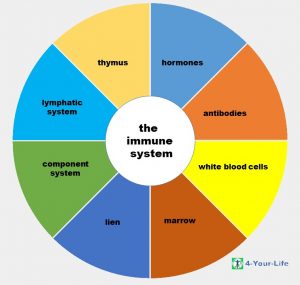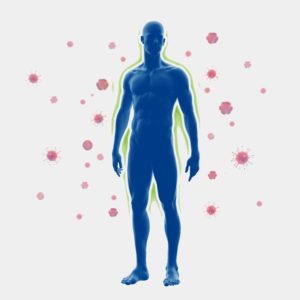The immune system (Latin immunis, German’untouched, free, pure) is the biological defence system of higher organisms that prevents tissue damage caused by pathogens.
 It removes microorganisms and foreign substances that have entered the body and is also capable of destroying cells that have become defective. The immune system is a complex network of different organs, cell types and molecules and the central object of immunology research.
It removes microorganisms and foreign substances that have entered the body and is also capable of destroying cells that have become defective. The immune system is a complex network of different organs, cell types and molecules and the central object of immunology research.
The immune system is of great importance for the physical integrity of living beings, because practically all organisms are constantly exposed to the influences of the living environment; some of these influences pose a threat: If harmful microorganisms penetrate the body, this can lead to malfunctions and diseases. Typical pathogens are bacteria, viruses and fungi, as well as single-cell (e.g. protozoa such as plasmodia) or multicellular parasites (e.g. tapeworms).
Changes inside the body can also threaten the existence of a living being: If normal body cells lose their healthy function over time, they usually die and have to be degraded (necrosis) or degrade themselves (apoptosis). In rare cases they can also degenerate pathologically and lead to the development of cancer.
All living beings therefore have protective functions. Even simple organisms have such a defence mechanism, the so-called innate immune response. It originated very early in the tribal history of living beings and has remained largely unchanged ever since. The vertebrates also developed a complex, adaptable, so-called adaptive immune defence, which protects them even more effectively against pathogens.
(Quelle: Wikipedia)

 Your immune system is responsible for maintaining your health. A healthy diet strengthens it and promotes the health of the whole body to ward off pathogens such as viruses, bacteria and parasites. This defence system runs through the body like a big net. The immune system is the human body’s defence system against all pathogens (microorganisms such as viruses, bacteria, parasites) and foreign substances with which humans come into contact. It is a system that runs through our entire body like a large network to protect our health.
Your immune system is responsible for maintaining your health. A healthy diet strengthens it and promotes the health of the whole body to ward off pathogens such as viruses, bacteria and parasites. This defence system runs through the body like a big net. The immune system is the human body’s defence system against all pathogens (microorganisms such as viruses, bacteria, parasites) and foreign substances with which humans come into contact. It is a system that runs through our entire body like a large network to protect our health.